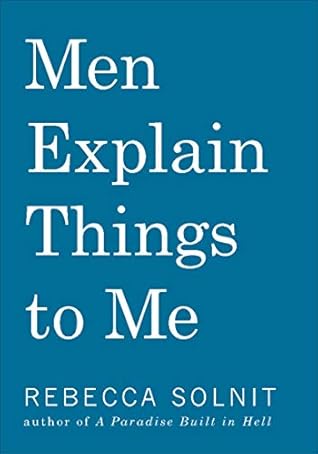More on this book
Community
Kindle Notes & Highlights
But explaining men still assume I am, in some sort of obscene impregnation metaphor, an empty vessel to be filled with their wisdom and knowledge.
Violence doesn’t have a race, a class, a religion, or a nationality, but it does have a gender.
The pandemic of violence always gets explained as anything but gender, anything but what would seem to be the broadest explanatory pattern of all.
just think that if we noticed that women are, on the whole, radically less violent, we might be able to theorize where violence comes from and what we can do about it a lot more productively. Clearly the ready availability of guns is a huge problem for the United States, but despite this availability to everyone, murder is still a crime committed by men 90 percent of the time.
“Women worldwide ages 15 through 44 are more likely to die or be maimed because of male violence than because of cancer, malaria, war and traffic accidents combined,” writes Nicholas D. Kristof, one of the few prominent figures to address the issue regularly.
That assault is part of the great class war of our era, in which the rich and their proxies in government have endeavored to aggrandize their holdings at the expense of the rest of us. Poor countries in the developing world paid first, but the rest of us are paying now, as those policies and the suffering they impose come home to roost via right-wing economics that savages unions, education systems, the environment, and programs for the poor, disabled, and elderly in the name of privatization, free markets, and tax cuts.
To spin the web and not be caught in it, to create the world, to create your own life, to rule your fate, to name the grandmothers as well as the fathers, to draw nets and not just straight lines, to be a maker as well as a cleaner, to be able to sing and not be silenced, to take down the veil and appear: all these are the banners on the laundry line I hang out.
“The future is dark, which is the best thing the future can be, I think,” Virginia Woolf wrote in her journal on January 18, 1915,
future is dark, which is the best thing the future can be, I think. It’s an extraordinary declaration, asserting that the unknown need not be turned into the known through false divination or the projection of grim political or ideological narratives; it’s a celebration of darkness, willing – as that “I think” indicates—to be uncertain even about its own assertion.
Despair is a form of certainty, certainty that the future will be a lot like the present or will decline from it; despair is a confident memory of the future, in Gonzalez’s resonant phrase. Optimism is similarly confident about what will happen. Both are grounds for not acting. Hope can be the knowledge that we don’t have that memory and that reality doesn’t necessarily match our plans; hope like creative ability can come from what the Romantic poet John Keats called Negative Capability.
My friend Chip Ward speaks of “the tyranny of the quantifiable,” of the way what can be measured almost always takes precedence over what cannot: private profit over public good; speed and efficiency over enjoyment and quality; the utilitarian over the mysteries and meanings that are of greater use to our survival and to more than our survival, to lives that have some purpose and value that survive beyond us to make a civilization worth having.
It is difficult, sometimes even impossible, to value what cannot be named or described, and so the task of naming and describing is an essential one in any revolt against the status quo of capitalism and consumerism. Ultimately the destruction of the Earth is due in part, perhaps in large part, to a failure of the imagination or to its eclipse by systems of accounting that can’t count what matters.
Voices in the mainstream insisted he was mentally ill, as though that settled it, as though the world were divided into two countries called Sane and Crazy that share neither border crossings nor a culture. Mental illness is, however, more often a matter of degree, not kind, and a great many people who suffer it are gentle and compassionate. And by many measures, including injustice, insatiable greed, and ecological destruction, madness, like meanness, is central to our society, not simply at its edges.
Finding ways to appreciate advances without embracing complacency is a delicate task. It involves being hopeful and motivated and keeping eyes on the prize ahead. Saying that everything is fine or that it will never get any better are ways of going nowhere or of making it impossible to go anywhere.


